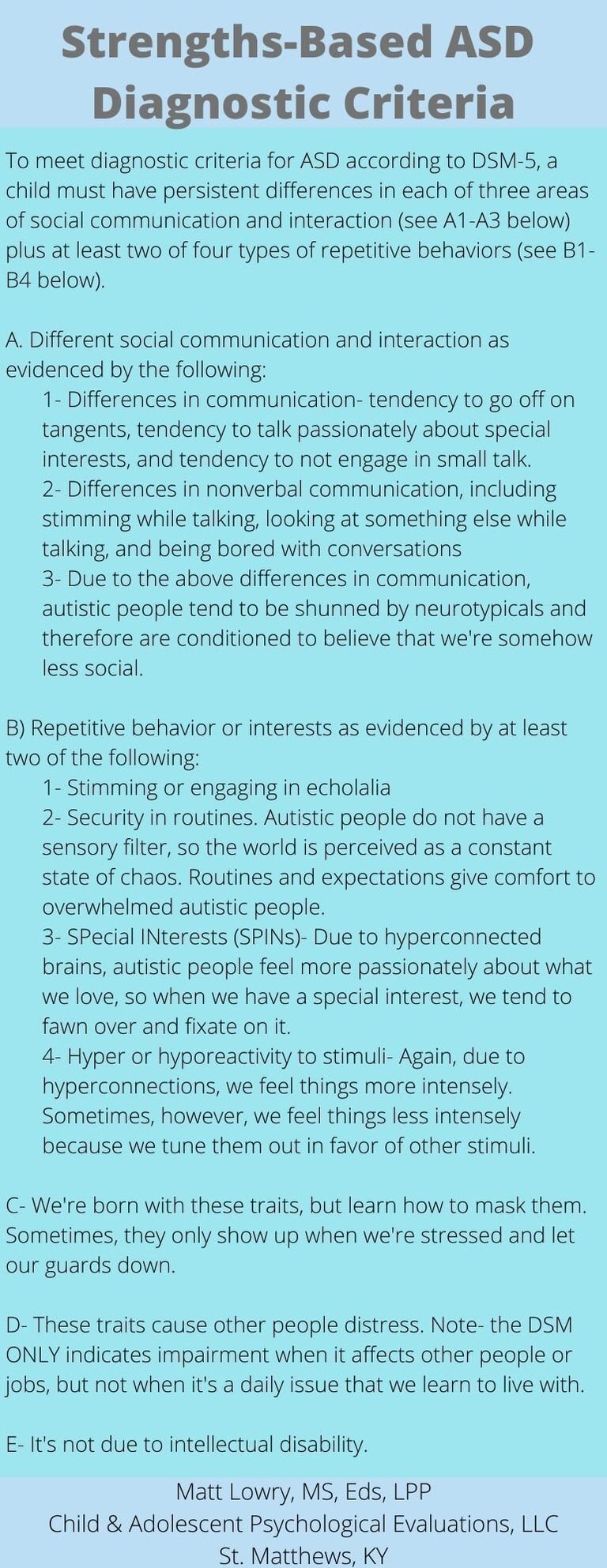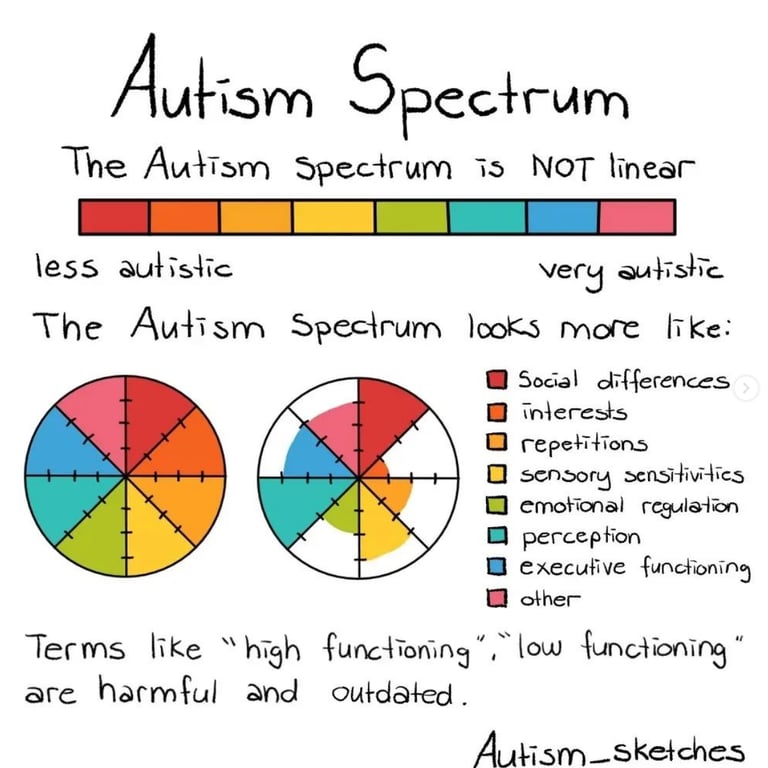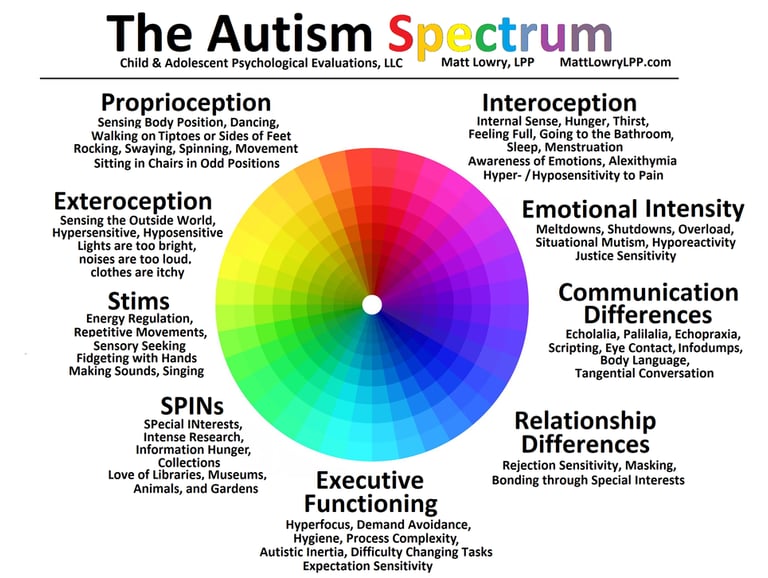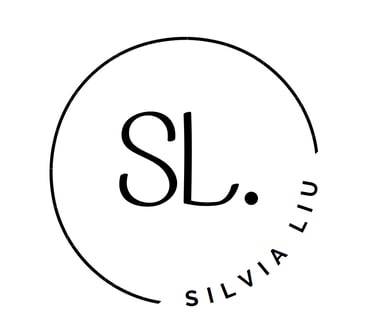Why I Love Being Autistic
An evolving list of the reasons for why I appreciate my autistic brain.
Silvia Liu, Psy.D.
4/15/20234 min read


Autism is defined as a neurodevelopmental disorder in the Diagnostic and Statistical Manual of Mental Disorders, Fifth Edition (DSM-5). The criteria to qualify for this diagnosis include two main things:
Persistent deficits in social communication and social interaction across multiple contexts
Restricted, repetitive patterns of behavior, interests, or activities
Within each of these criterion, the DSM-5 list a number of illustrative, but not exhaustive examples. That means that what is written in the DSM simply represents a small subset of what could be considered autism. I am intentionally not reproducing these examples here because they are couched in pathologizing language. The DSM is written from the framework of the medical model, and that means that a diagnosis is always seen as a deficit or dysfunction within the person.
As a psychologist, I need to understand the medical model to diagnose. However, as a healer, I subscribe to other models, including the recovery model (i.e., a process-oriented model that emphasizes and supports a person's potential for recovery) and the social model of disability (i.e., people are disabled by barriers in society, not by their impairment or difference).
So instead, I would like to share a definition of autism from a strengths-based perspective (criteria created by Matt Lowry):


As you can see, autistic individuals tend to have differences in ways of communicating and relating to others and the world, which may or may not be obvious (due to masking). Autistic people are sometimes referred to as "on the spectrum," which is mistakenly thought of as a linear progression of autistic traits from very autistic to more neurotypical. But the autism spectrum actually illustrates the varied profiles of processing, abilities, and experiences of the autistic community. This is illustrated below in an infographic from Autism_Sketches:
Here is another infographic from Matt Lowry with specific examples of the kind of profiles you might find on the autism spectrum:


So why do I love being autistic, and are autistic therapists any good at counseling others?
I would like to declare proudly that most or all of the things I love about myself is an autistic trait. In fact, being autistic is why I am good at my job. Let me explain.
As neuroscience advances, evidence now show hyperconnectivity in autistic brains. There are theories about how our brains do not go through as much pruning as typical 2-year-olds and we keep the multitude of connections in the brain that are established in our first two years of life. Our hyperconnected brains result in hyper- or hypo-sensitivity in our sensory systems. In other words, we experience our senses differently - sometimes what we sense is bigger and more intense than others, while there are other instances where we don't even register what others may feel intensely about.
With all that sensory and perceptual information, we naturally develop into pattern seekers with a bottom-up processing approach. That is, details turn us on or soothe us. As a psychologist, my autistic brain helps me perceive patterns more quickly and accurately. It is helpful in both therapy and assessment to be able to pick up on my clients' silently held emotions, beliefs, or attitudes, and be able to represent these in words. Moreover, autistic individuals often communicate in a direct manner. When I communicate in my natural autistic manner, I am transparent and authentic; I express the patterns I perceive explicitly; and I break things down in a way that is often helpful for my clients. If you ever feel lost, consider how autistic therapists can help you sort through your confused thoughts and feelings with more precision.
More than anything, autistic individuals are interesting to be around because they have special interests that are integral to their identity. I'd like to think that my clients have fun with me because I show up with my quirks and my passions, which then help them also embrace who they are. The mere existence of autistic people gives permission for others to be apologetically themselves.
Lastly, as a person with several marginalized identities (e.g., Asian in the US context, autistic, woman), I understand privilege and systemic oppression well. I lived a life where I was told by even the most well-intentioned people that I am constantly missing the mark of being what people expected of me. With my best efforts at studying other people to adjust myself, I realized that there would always be a disgruntled party. Either I am authentic and face the cold attitudes of others, or I mask expertly and never feel satisfied because no one sees the real me. Therefore, it is important to me to affirm my clients fully as they are, within the context of how they came to be. I want to inspire my clients to love themselves the way I now love me.
Being autistic is literally how I am able to be the psychologist I am.


My office
Telehealth Only
Contacts
drliu@stepsps.com
+(626) 884-1770
Silvia Liu, Psychologist


Insurance Accepted
Medicare
Aetna
Anthem Blue Cross California
Cigna
United Healthcare
Oxford
Blue Shield of California
Blue Cross Blue Shield
Optum
Kaiser Permanente
Modern Health
